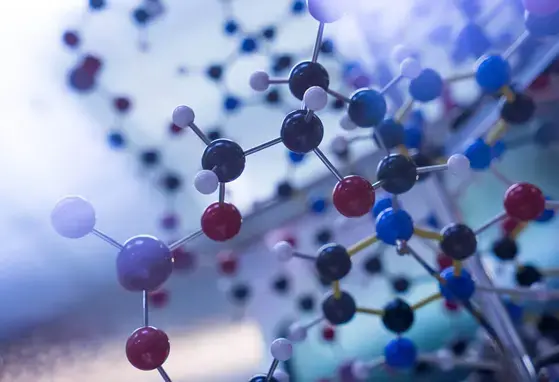Interview with Dr. Susan Chung – Maternal Nutrition: When West Meets East

Dr. Susan Chung is uniquely qualified in both Western nutritional science and Chinese Medicine. In a recent interview, Dr. Chung discussed how diet changes and herbal tonics can help correct common internal imbalances in Hong Kong women who are preparing for a healthy pregnancy. This article presents highlights from the interview.
- Maternal nutritional assessment and internal imbalances from traditional Chinese medicine’s perspectives
- Common dietary changes and herbal tonics for preconception and pregnancy in Hong Kong

Dr. Susan Chung, PhD
Registered Dietitian (British Columbia, Canada)
Registered Chinese Medicine Practitioner (Hong Kong)
Private Practice, Hong Kong
- How do you compare Western and Chinese ideologies on maternal nutrition?
- How is a woman’s nutritional status assessed in TCM?
- What are the most commonly observed imbalances in Hong Kong women and what are the causes?
- How are the imbalances corrected in women who are trying to conceive?
- What foods nourish the Kidney and stimulate conception?
- Are there any foods that should be avoided before and during pregnancy?
- Which foods can help relieve pregnancy-associated symptoms?
- What are the common herbal tonics used for preconception and pregnancy in Hong Kong?
- Are there any precautions with herbal tonics?
- What advice can healthcare professionals give to women who are taking Chinese medicine for preconception or pregnancy?
- Summary
SC: Dr. Susan Chung
R: Reporter
R: How do you compare Western and Chinese ideologies on maternal nutrition?
SC: Western nutrition theory focuses on the analytical and quantitative categorization of foods, which is based on nutrients such as carbohydrates, fat, protein, vitamins, minerals, and trace elements.1
The Chinese theory, however, follows the qualitative, holistic concept of yin (陰) and yang (陽) and illustrates how unique properties of food and medicinal herbs influence the body.1 Chinese nutrition adopts traditional Chinese medicine (TCM) principles – balancing yin and yang and the five organ systems of the body, which are the Heart, Liver, Spleen, Lung, and Kidney. Each organ system is considered to have its own functions, but with a wider scope than the purely physiological functions described in Western medicine.2
However, when the two different theories are applied to maternal nutrition, they both aim to optimize maternal and foetal health across preconception and different stages of pregnancy.3
R: How is a woman’s nutritional status assessed in TCM?
SC: TCM practitioners use the Four Diagnostic Method – observing (or inspecting), listening and smelling, questioning, and palpating – to assess an individual’s health condition. To diagnose any imbalances or diseases, they will inspect a woman’s vitality, physical condition, tongue, and excreta; listen to her voice and breathing sound and smell the odour; ask about her medical history, appetite, bowel movement and symptoms; and analyse her pulse to determine her body type and possible suboptimal functions in the organ systems.4
R: What are the most commonly observed imbalances in Hong Kong women and what are the causes?
SC: Common imbalances found in women are usually in qi (life force, 氣), yin/yang, cold/hot (寒/熱), weakness/blockage (虛/實), and damp/dry (濕/燥) pertaining to the five organ systems.5 According to a local survey which I have conducted in 40 young female students aged 18–22 in Hong Kong, all but one of the participants had an imbalanced body type: low in qi (22.5%), deficient in yin and having damp heat (17.5% each), special intrinsic (特稟) (12.5%), deficient in yang and emotionally depressed (10% each), and stagnation of blood (7.5%).
Unhealthy lifestyle and dietary factors may cause certain kinds of imbalances. For example, weakness in qi and yang is related to sedentary lifestyle, lack of exercise, and eating too much cold foods; deficiency in yin can be due to staying up late and eating too much spicy foods and too little fruits and vegetables. Eating processed foods, snacking, overeating, and eating too little fruits and vegetables may lead to damp heat.6
Some imbalances are associated with specific symptoms. Young women presenting with stagnation of blood may have dysmenorrhoea, and those presenting special intrinsic body type may have some form of allergy or sensitivity.6
R: How are the imbalances corrected in women who are trying to conceive?
SC: The Kidney must be nourished because the Kidney system encompasses not only urinary, but also reproductive functions, according to TCM theories. Therefore, to increase the chance of conception and to ensure a successful pregnancy, the Kidney system must be healthy and in balance.
In case of infertility, the cause should be identified so that appropriate treatments can be prescribed. For instance, Kidney yang should be tonified if it is insufficient (腎陽不足–補腎壯陽); Spleen and Kidney yang should be warmed if they are weak (脾腎陽虛–溫補脾腎); qi and blood should be tonified if they are weak to benefit the Kidney and the foetus (氣血兩虛–補氣養血,益腎育麟). If there is phlegm and accumulation of dampness (痰濕內蘊), the phlegm should be dried and expelled (燥濕化痰).
During pregnancy, it is important to keep the internal body environment balanced and the qi and blood in harmony to ensure a smooth pregnancy and healthy development of the baby.7 Internal balance can be promoted by Chinese nutritional and herbal therapy after a comprehensive body assessment by a TCM practitioner. Acupuncture can also be considered as it can help the body to return to balance by stimulating acupoints (穴位) without using herbs.
R: What foods nourish the Kidney and stimulate conception?
SC: Foods that are believed to nourish the Kidney in TCM include black sesame, goji berry (杞子), taxilli herba (桑寄生), and cinnamon.
R: Are there any foods that should be avoided before and during pregnancy?
SC: There are no standardized food lists in TCM for pregnancy; hence, recommendations from practitioners may vary. However, foods with medicinal effects, especially purgative effect, such as aloe, should be used with caution or avoided. Foods that are suitable and unsuitable depend on the body characteristics and health status of the woman (Table 1). In general, women with a “cold” body type should limit consumption of food with cooling properties. Alternatively, ginger juice, spices, onions, garlic or pepper can be added when cooking “cooling” foods to neutralize the cooling effect. Likewise, women with a “hot” body type should consume less food with warming properties, and “cooling” foods (most fruits and vegetables) can be used to clear away the excess heat.5
In TCM, consumption of cold and icy foods leads to accumulation of dampness, malfunction of the Spleen system (equivalent to the digestive system in Western medicine) and fatigue. According to the principles of the five elements (Metal, Wood, Water, Fire, and Earth), damaging the Spleen will impair the Kidney (Figure 1). Therefore, most people (pregnant or not) should avoid cold and icy foods as much as possible.6
R: Which foods can help relieve pregnancy-associated symptoms?
SC: Common pregnancy symptoms include peripheral oedema, morning sickness, and constipation. Eating small red bean congee (赤小豆粥) may help reduce peripheral oedema by helping the Spleen system to remove dampness.5 For morning sickness, fresh ginger is effective for the relief of mild to moderate nausea and vomiting.8 Adding a few drops of ginger juice to congee can ease the discomfort. Black sesame milk may alleviate constipation symptoms due to the high fat content of black sesame.5
R: What are the common herbal tonics used for preconception and pregnancy in Hong Kong?
SC: There are two common herbal tonic prescriptions for preconception: one for nourishing Kidney yin (左歸丸) in women with lightheadedness, weakness, and menstrual dysfunction, and the other for nourishing Kidney yang (右歸丸) in those with cold intolerance, soft stools and weakness (Table 2). There is also a common tonic used to nourish the Kidney and calm the foetus for pregnant women (壽胎丸) (Table 2). TCM practitioners will modify the prescription by adding or omitting herbs as necessary based on the symptoms and characteristics of the patient.5
R: Are there any precautions with herbal tonics?
SC: In general, TCM practitioners do not recommend potent tonics and those with purgative effect during pregnancy. Mild tonics that are suitable for most body types are preferred, such as lilybulb, Dioscoreae rhizome (山葯), and lotus seed.5
Pregnant women should not use over-the-counter or pre-made Chinese herbal formulations without a TCM practitioner’s advice. Some herbs are prohibited during pregnancy and some should be used with caution. These herbs are usually potent in nature and may have laxative, diuretic or anti-coagulating effects; some herbs could be toxic if misused. Examples are purging croton seed (巴豆), ternate pinellia (半夏), and centipede (蜈蚣), etc.9
R: What advice can healthcare professionals give to women who are taking Chinese medicine for preconception or pregnancy?
SC: Obtaining adequate nutrients from all food groups (Western nutrition) and correcting body imbalance (TCM approach) are feasible when the two disciplines are applied together. Although this kind of comprehensive management is more common in China, there are some medical centres in Hong Kong that provide integrated Chinese and Western medicine services, in which patients can be managed in a holistic way. When patients are seeking advice separately from individual Western and Chinese practitioners, open communication among all parties is the key to benefiting both mother and infant across all stages of pregnancy.
Table 1. Table 1. Warming and cooling characteristics of common foods10
| Fruits | Vegetables | Meat & seafood | Grains & legumes | Condiments | |
|---|---|---|---|---|---|
| Cooling | Apple Banana Pear Watermelon |
Bok choy Celery Cucumber Turnip |
Duck Fish and seafood* (eg, crab, clams) |
Green bean Soba Tofu Wheat |
Sesame oil |
| Warming | Cherry Guava Longan Peach |
Chives Leek Onion Parsley Pumpkin |
Beef Chicken Lamb Fish and seafood* (eg, yellow eel, shrimp) |
Glutinous rice | Chilli Ginger Pepper Star anise Cinnamon |
| Neutral | Snow pear | Carrot Chinese kale Choi sum Mushroom Potato Wood ear Yam |
Eggs Fish and seafood* (eg, white eel, sea bass, oyster, abalone) Goose Pigeon Pork |
Black bean Rice Soybean |
Honey Peanut oil Sugar |
* Different kinds of fish have different characteristics.
Table 2. Common tonic prescriptions for preconception and pregnancy5
| Preconception | Pregnancy | |
|---|---|---|
| Nourish Kidney yin (左歸丸) |
Nourish Kidney yang (右歸丸) |
Nourish Kidney and calm foetus (壽胎丸) |
| Renmanniae preparata radix (熟地黃) Dioscoreae rhizome (山葯) Macrocarpii fructus (山茱萸) Lycil fructus (杞子) Cuscutae semen (菟絲子) Colla cornus cervi (鹿角膠) Testudinis carapaxet plastrum (龜板) Achyranthis bisdentatae radix (牛膝) |
Renmanniae preparata radix (熟地黃) Dioscoreae rhizome (山葯) Macrocarpii fructus (山茱萸) Lycil fructus (杞子) Cuscutae semen (菟絲子) Colla cornus cervi (鹿角膠) Eucommiae cortex (杜仲) Angelicae sinesis radix (當歸) Typhonii rhizome (附子) Cinnamomi cassiae cortex (肉桂) |
Cuscutae semen (菟絲子) Taxilli herba (桑寄生) Dispsaci asperoidis radix (川續斷) Asini corii colla (阿膠) |
Figure 1. Relationship of the 5-element and 5-organ network6
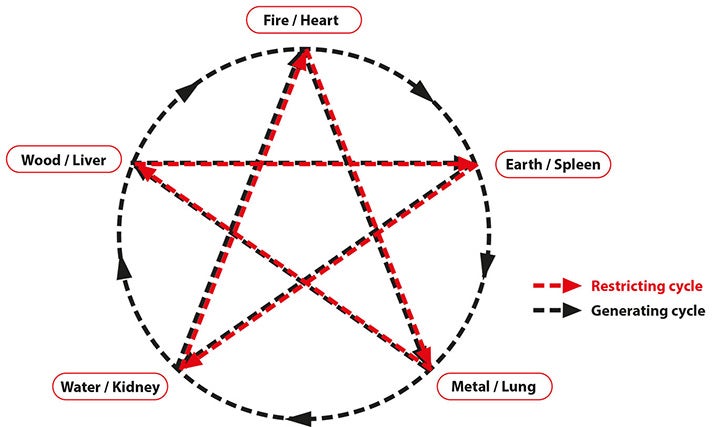
WYE-EM-084-APR-15
Reference
- Kastner J. Chinese nutrition therapy: Dietetics in traditional Chinese medicine (TCM). Thieme, 2004.
- College of Traditional Chinese Medicine Practitioners and Acupuncturists of British Columbia website. Introduction to Traditional Chinese Medicine. Available at http://www.ctcma.bc.ca/index.php?id=20#7. Accessed 8 March 2015.
- Gillen-Goldstein J, et al. Nutrition in pregnancy. Available at http://www.uptodate.com/contents/nutrition-in-pregnancy. Accessed 6 March 2015.
- Hong Kong Department of Health website. Diagnostic Methods and Features of Chinese Medicine Practitioners. Available at http://www.cmd.gov.hk/html/eng/health_info/pamphlet/Diagnostic_Methods_and_Features_of_CMP.html. Accessed 11 March 2015.
- Ma BZ. Gynecology in Chinese Medicine. Shanghai Scientific and Technical Publishers. 1997. (Book in Chinese)
- Wu DX. Foundational principles in Chinese Medicine. Shanghai Scientific and Technical Publishers. 1995. (Book in Chinese)
- Health Xchange website. Traditional Chinese Medicine and Pregnancy. Available at: http://www.healthxchange.com.sg/healthyliving/womenhealth/pages/traditional-chinese-medicine-and-pregnancy.aspx. Accessed 17 March 2015.
- Saberi F, et al. Nurs Midwifery Stud 2014;3:e11841.
- Lei ZQ. Pharmacology in Chinese Medicine. Shanghai Scientific and Technical Publishers. 1995. (Book in Chinese)
- Liang R, et al. Traditional Chinese Medicine Nutrition: Herbal diet and therapy guide. Guangdong Higher Education Press. 1999. (Book in Chinese)
If you liked this post you may also like
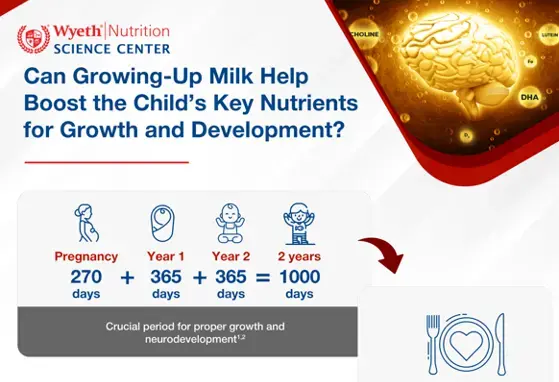
Infographic - Can Growing-Up Milk Help Boost the Child's Key Nutrients for Growth and development?
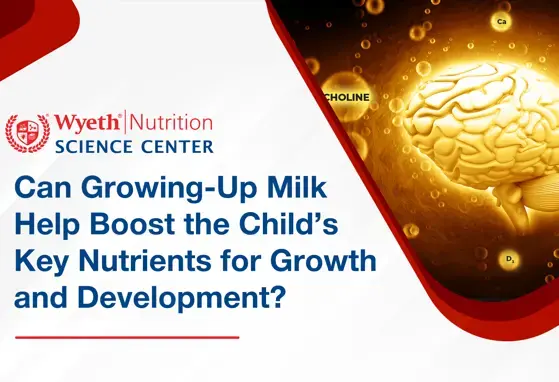
The Learning Lead - Volume 2, 2024: "Can Growing-Up Milk Help Boost The Child’s Key Nutrients for Growth and Development?"
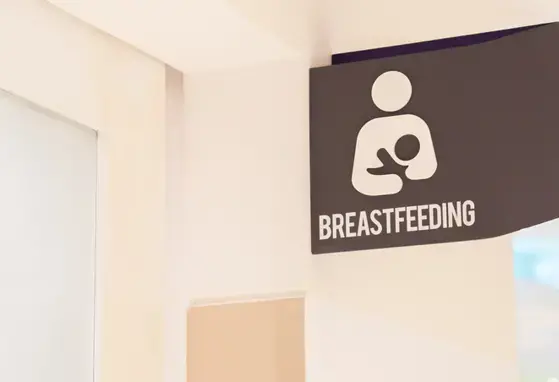
Maternal Dietary Intake and Human Milk Composition
